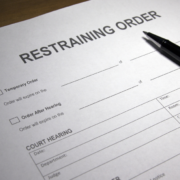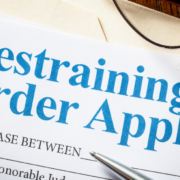Filing for a restraining order — legally called a “Protection From Abuse” (PFA) order here in Pennsylvania — can keep you and your children safe from an abuser. Initially, the process of filing for a restraining order in Pennsylvania may sound overwhelming or confusing. But it actually just involves a few simple steps, and once you complete them, you can gain peace of mind.
What a Restraining Order Can Give You
You can file for a restraining order against an intimate partner or a family member, including a spouse or ex-spouse, parent, child, domestic partner, or person related by marriage. In Pennsylvania, these orders do not protect victims who experience abuse from a stranger or a person with whom they are not “intimately involved.”
A restraining order or PFA offers these protections:
- The abuser cannot go near the victim’s home — even if the abuser owns it.
- The abuser cannot have any contact with the victim or their kids.
- The abuser will need to turn over their weapons.
A judge may order a restraining order to stay in place for up to three years to protect the victim’s safety. In some cases, a victim can use a restraining order to require the abuser to provide financial support.
How To File for a Restraining Order in Pennsylvania
If you are in immediate danger of domestic violence or abuse, you will file for a temporary PFA that will go into effect instantly. A judge will review this temporary order at a hearing and determine whether to order a final PFA.
This is the process to file for a temporary PFA:
- You will fill out a petition: If you are filing on a weekday, go to the courthouse to fill out a petition for a restraining order. If you are in immediate danger on an evening or weekend, call the police; they can provide protection until you file at the courthouse the next weekday.
- A judge will review the petition: A judge may ask questions about your reasons for filing the petition. Then, they will grant or deny the temporary PFA and schedule a final hearing within 10 business days.
- The sheriff will deliver the petition to your abuser: A local sheriff will deliver the temporary PFA order, a petition, and the notice of the final hearing to your abuser.
- You will attend the final hearing: You can have an attorney and/or a domestic violence advocate with you at the final hearing. If you and the defendant agree on the terms of the order, the judge will grant it; if either party disagrees, they will share their account with the judge. Your attorney can provide evidence of why the restraining order is necessary.
Your abuser does not need to be present when you file. However, they can attend the final hearing.
Karen Ann Ulmer, P.C., Can Help You Through This Process
We understand that filing for a PFA (Protection From Abuse) can be scary and overwhelming. Our compassionate attorneys at Karen Ann Ulmer, P.C., are here to guide you through the process and provide legal representation. Contact us today at (866) 349-4265 for assistance filing for a restraining order.




